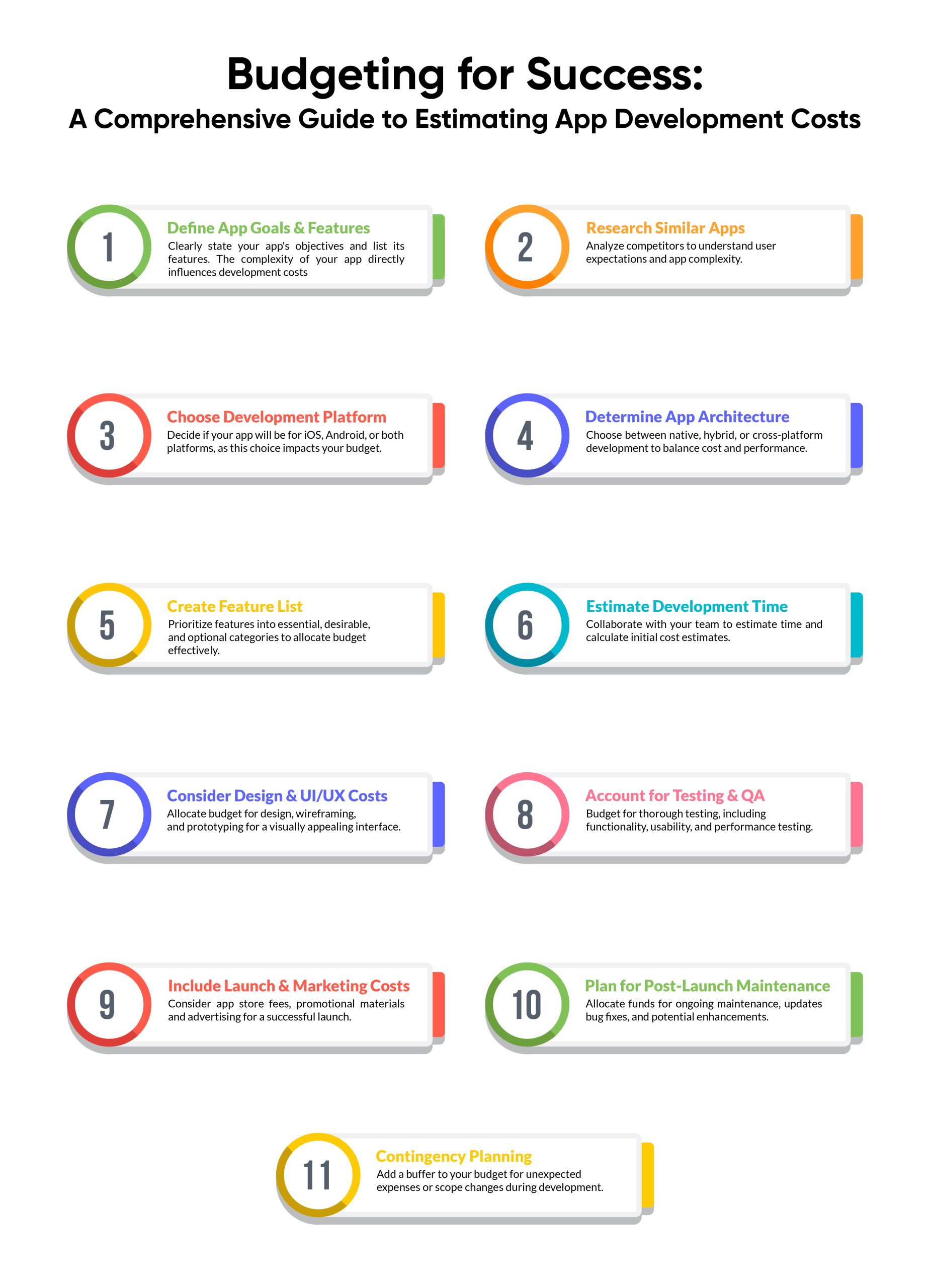Creating a mobile app has become almost essential for businesses aiming to thrive in the competitive market. Whether you’re a startup with a groundbreaking idea or an established company looking to expand your digital presence, understanding “what is the average cost of app development” is crucial for effective budget planning.
Introduction
Embarking on the journey of app development can be both thrilling and daunting. The excitement of bringing your vision to life is often accompanied by the uncertainty of the associated costs. So, what is the average cost of app development?
Factors Influencing the Cost to Build a Mobile App
Several factors play a pivotal role in determining the overall cost to develop an app. Each project is unique, and costs can vary based on various considerations. Here are the key factors to keep in mind:
- App Complexity:
- Simple apps with basic features are generally more affordable.
- Complex apps with advanced functionalities and integrations can escalate costs.
- Platform Choice:
- Developing for iOS, Android, or both impacts the overall cost.
- Cross-platform development tools might offer cost-effective solutions.
- Design and User Interface:
- A sleek and user-friendly design contributes to higher costs.
- Custom designs and animations enhance user experience but come with additional expenses.
- Backend Development:
- Features like user authentication, data storage, and server infrastructure contribute to backend development costs.
- Testing and Quality Assurance:
- Rigorous testing is crucial for a bug-free app, affecting both time and costs.
- Maintenance and Updates:
- Ongoing support, updates, and maintenance contribute to the overall lifetime cost.
Comparing Development Approaches
As you embark on the journey of app development, one critical decision is choosing the right development approach. The approach you opt for significantly impacts the overall mobile app development cost, time-to-market, and the user experience of your app. Let’s delve into the comparison of three main development approaches: native, hybrid, and cross-platform when it comes to “what is the average cost of app development“.
-
Native App Development:
- Definition: Native apps are developed for a specific platform, either iOS or Android, using platform-specific programming languages (Swift or Objective-C for iOS, Java or Kotlin for Android).
- Pros:
- High Performance: Native apps generally offer better performance as they are optimized for the specific platform.
- Access to Native Features: Full access to device features and capabilities.
- Seamless User Experience: Native apps tend to provide a smoother and more responsive user experience.
- Cons:
- Higher Development Costs: Developing separate apps for each platform can be more expensive.
- Longer Development Time: Creating two separate codebases increases development time.
-
Hybrid App Development:
- Definition: Hybrid apps are built using web technologies (HTML, CSS, JavaScript) and are wrapped in a native container, allowing them to run on multiple platforms.
- Pros:
- Cost-Effectiveness: Single codebase for multiple platforms reduces development costs.
- Faster Development: Faster development compared to native apps due to code reusability.
- Easier Maintenance: Updates can be applied simultaneously across platforms.
- Cons:
- Performance: Generally, hybrid apps may not perform as well as native apps, especially for resource-intensive tasks.
- Limited Access to Native Features: Some native features may not be accessible or might require additional plugins.
-
Cross-Platform App Development:
- Definition: Cross-platform development involves using frameworks like React Native or Flutter to write code once and deploy it on multiple platforms.
- Pros:
- Code Reusability: Significant code reusability across different platforms.
- Native-Like Performance: Cross-platform frameworks aim to provide near-native performance.
- Hybrid App Development vs NativeOne team can work on both iOS and Android versions simultaneously.
- Cons:
- Learning Curve: Developers may need to learn the specific framework, potentially increasing the initial learning curve.
- Framework Limitations: Some advanced native features may not be fully supported.
Selecting the Right Approach:
- Consider Your App Requirements: The nature and requirements of your app play a crucial role in determining the suitable approach.
- Target Audience: If your target audience is predominantly on one platform, native development might be preferred.
- Budget and Timeline: Evaluate your budget constraints and desired timeline for the project.
- Future Scalability: Consider the potential for future scalability and updates, as this can impact the choice of development approach.
Choosing the Right Development Team
One of the critical decisions in the app development journey is selecting the right development team or agency. The success of your project is heavily reliant on the expertise, skills, and collaboration of the individuals involved. Here’s a detailed exploration of the key considerations when choosing the perfect development team for your app:
Evaluate Expertise and Specializations:
- Look for a team with expertise in the specific technology stack required for your app (e.g., Swift for iOS, Kotlin for Android).
- Assess their experience in developing apps similar to yours, as this familiarity can streamline the development process.
Check Previous Work and Portfolio:
- Review the team’s portfolio to gauge the quality of their previous projects.
- Assess the diversity of the apps they’ve developed to ensure versatility and adaptability to various project requirements.
Client Testimonials and Reviews:
- Seek client testimonials and reviews to gain insights into the team’s communication, professionalism, and ability to meet deadlines.
- Platforms like Clutch or Upwork can provide authentic reviews from previous clients.
Communication and Collaboration Skills:
- Effective communication is crucial for project success. Ensure the team can articulate technical concepts in a way that aligns with your understanding.
- Evaluate their collaboration skills, as seamless teamwork fosters a smoother development process.
Scalability and Future Support:
- Consider the team’s ability to scale along with your project. Ensure they can accommodate additional resources if needed.
- Discuss post-launch support and maintenance services to secure long-term success for your app.
Development Process and Methodology:
- Inquire about the team’s development process and methodologies. Agile, Scrum, or other frameworks can impact the project’s efficiency and flexibility.
- Understand how they handle changes in requirements and incorporate feedback during the development cycle.
Transparency and Project Management:
- Transparency is vital for a healthy client-developer relationship. Ensure the team provides clear project timelines, milestones, and regular updates.
- Assess their project management tools and methodologies to gauge their commitment to delivering on time.
Cost Estimation and Budgeting:
- While price is a determining factor, it should not be the only determining factor when it is about “what is the average cost of app development”. Evaluate the value the team brings to your project in relation to the proposed cost.
- Discuss the breakdown of costs, potential additional charges, and how they handle unexpected expenses.
Legal Considerations:
- Review and understand the legal aspects of the development contract. Ensure clarity on intellectual property rights, confidentiality, and dispute resolution.
- Seek legal counsel to verify the contract’s fairness and protect your interests.
Flexibility and Adaptability:
- Assess the team’s flexibility in adapting to changes or unforeseen challenges during the development process.
- A team that can pivot quickly and efficiently is invaluable in the dynamic landscape of app development.
The Average Cost to Make an App
To provide a clearer picture, let’s break down term “what is the average cost of app development” based on complexity:
- Simple Apps (e.g., Basic Calculator):
- Development Cost: $5,000 – $20,000
- Timeline: 1 – 3 months
- Moderate Complexity Apps (e.g., Social Networking App):
- Development Cost: $20,000 – $50,000
- Timeline: 3 – 6 months
- Highly Complex Apps (e.g., E-commerce Platform):
- Development Cost: $50,000 – $500,000+
- Timeline: 6 months – 1 year
Please note that these are rough estimates, and actual costs may vary based on specific project requirements and market rates.
Cost of Mobile App Development: A Quick Glance at the Numbers
Now, let’s take a look into a visual representation of the average costs with a handy table:
| Complexity Level |
Development Cost Range |
Timeline Range |
| Simple Apps |
$5,000 – $20,000 |
1 – 3 months |
| Moderate Complexity Apps |
$20,000 – $50,000 |
3 – 6 months |
| Highly Complex Apps |
$50,000 – $500,000+ |
6 months – 1 year |

FAQs: What is the average cost of app development
Q1: What contributes most to the cost of app development?
A: The complexity of the app, including features, design, and platform choice, significantly influences the cost.
Q2: Can I reduce app development costs without compromising quality?
A: Yes, exploring cross-platform development, opting for MVP (Minimum Viable Product), and effective project management can help manage costs.
Q3: How do ongoing maintenance costs factor into the overall expenses?
A: Ongoing maintenance costs are essential for updates, bug fixes, and improvements, typically accounting for 15-20% of the initial development cost annually.
Q4: Is it more cost-effective to develop for iOS or Android first?
A: It depends on your target audience. If you’re targeting a global audience, simultaneous development for both platforms might be beneficial.
Q5: Are there hidden costs in app development?
A: Yes, overlooked factors like app store fees, third-party integrations, and post-launch marketing can contribute to additional costs.
Conclusion – What is the average cost of app development
Understanding “what is the average cost of app development” is crucial for anyone venturing into the digital realm. By grasping the key factors influencing costs and exploring different approaches, you can embark on your app development journey with confidence. Remember, each app is unique, and the right investment today can lead to remarkable returns tomorrow.






